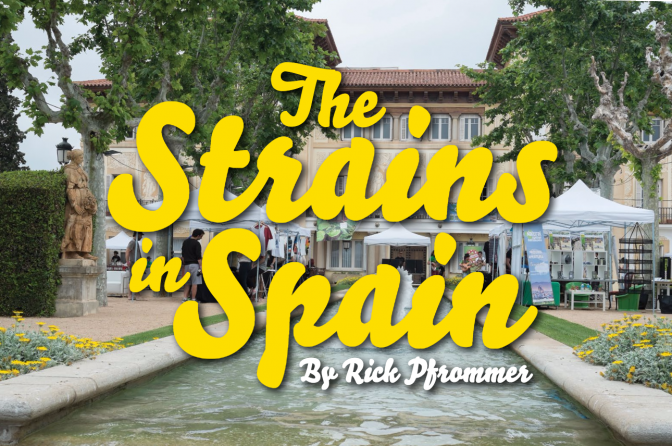Freedom Leaf Travel: The Strains in Spain

At least half a dozen cannabis-judging events are now held each year in Spain. From the windswept Canary Islands to sun-splashed Malaga on the Costa Del Sol, to ancient and breathtaking Barcelona, competitions of all sizes regularly take place.
I traveled to Spain to attend and judge the 3rd Annual Bio Cup on May 27–29. Organized by Santiago (he prefers not to use his last name), a longtime veteran of the international cannabis scene, the event was founded specifically to focus on organic, or “bio,” flowers and hash. Although small by U.S. standards, the Bio Cup has attracted some of the legends of the industry, including Howard Marks (a.k.a. Mr. Nice), who sadly passed away Apr. 10, and his associate and top breeder Shanti Baba. Most of these events attract 500 or fewer attendees; Spain’s unique approach to tolerating cannabis makes staging larger events more difficult.
Cannabis is not legal or even decriminalized in Spain. If you’re caught with any amount, an officer has the discretion to arrest you or give you a ticket. However, Spanish respect for the privacy rights of individuals has allowed for the rise and fall, and rise again, of cannabis social clubs. They have nice decor, cool tunes (often spun by an in-house DJ), juice, beer and wine, and counters where flowers and hash are sold. To become a member, you must pledge in writing that you will not take any herb or hash from the premises. Five grams is the most you can purchase, and you’re then supposed to consume it all in-house.
Other than a brief outdoor harvest period in the fall, almost all the flowers are lamp-grown. Although Spain’s climate is perfect for outdoor cultivation, most growing takes place in urban areas like Barcelona. Critical Jack and Jack Widow were easily the strongest strains I sampled in Spain.
 The varieties of cannabis vary from club to club, but most carry about 10 strains of flowers and a half-dozen kinds of hash. The selection is a blast from the past. Jack Herer and White Widow crosses abound, as do Critical Mass hybrids crossed with everything. OG Kush and Sour Diesel are hard to find, but the Spanish equivalent of Blue Dream, Amnesia Haze, is everywhere (although it varies widely in quality). Hash is mostly the water variety of middling quality, with some dry-sieve hash, as well. The only place I saw BHO was at the Bio Cup, which was held in an old former casino that dictator Francisco Franco used to entertain both the Nazis and the Italian fascists.
The varieties of cannabis vary from club to club, but most carry about 10 strains of flowers and a half-dozen kinds of hash. The selection is a blast from the past. Jack Herer and White Widow crosses abound, as do Critical Mass hybrids crossed with everything. OG Kush and Sour Diesel are hard to find, but the Spanish equivalent of Blue Dream, Amnesia Haze, is everywhere (although it varies widely in quality). Hash is mostly the water variety of middling quality, with some dry-sieve hash, as well. The only place I saw BHO was at the Bio Cup, which was held in an old former casino that dictator Francisco Franco used to entertain both the Nazis and the Italian fascists.
This incredible location has colonnaded walkways, burbling fountains and lots of green grass to lounge about on. California-based Pura Cali, an up-and-coming nutrient and grow supply business with an office in Barcelona, operated a dab bar. DJs played and quality food and drink were available. Breeders shared their secrets, and I discussed the creation of the Clean Green program and the growth of sun-grown cannabis in the States, and how that could apply to Spain. (See my article “Pot and Pesticides” in Issue 9 for more about Clean Green certification.)
When it was time to judge, we were whisked away in a van to a 13th-century villa that’s now a healing retreat. We smoked and talked, and tabulated results in the 700-year-old courtyard. There were 19 flower entries and nine hashes. A Sour Diesel cross from Canada won the competition—an appropriate choice since the next Bio Cup will take place in Vancouver Aug. 26–28.The Spanish cannabis scene is growing rapidly, as evidenced by the trade show Spannabis, which draws more than 30,000 people to Barcelona each March.
Women, however, have yet to take their place in the Spanish industry like they have in the States, Canada and the Netherlands. The club owners are overwhelmingly male, and at all the clubs I visited, not including the workers, I counted maybe one or two women. For medical users, there’s very little information given to members when they’re in the club, certainly nothing like we have in the better dispensaries in the States. But the social element of cannabis—something that’s disappearing in America in the headlong quest for profits—is just as important as its healing properties. We can certainly learn from each other.
If you enjoyed this Freedom Leaf article, subscribe to the magazine today!

